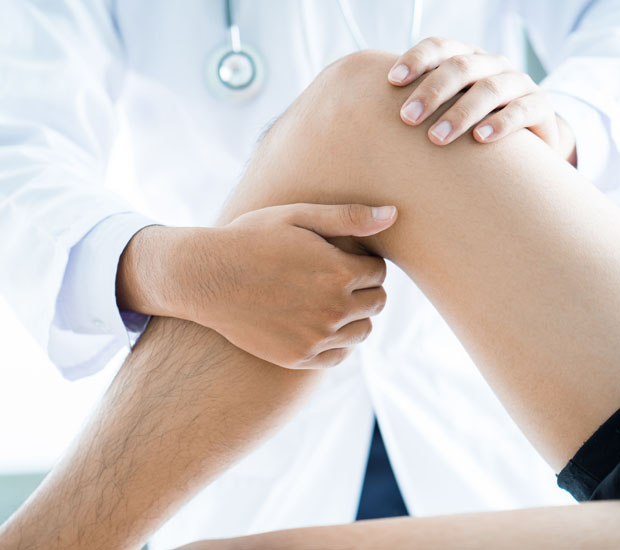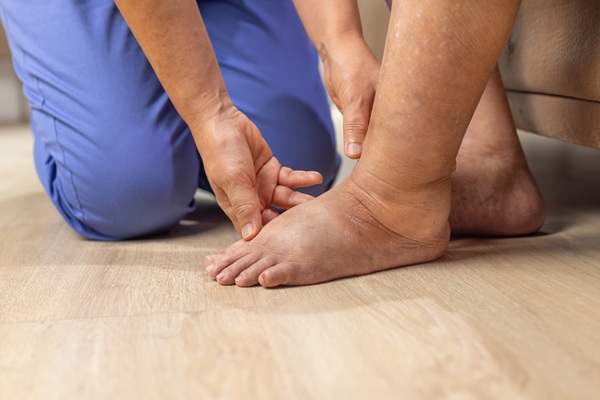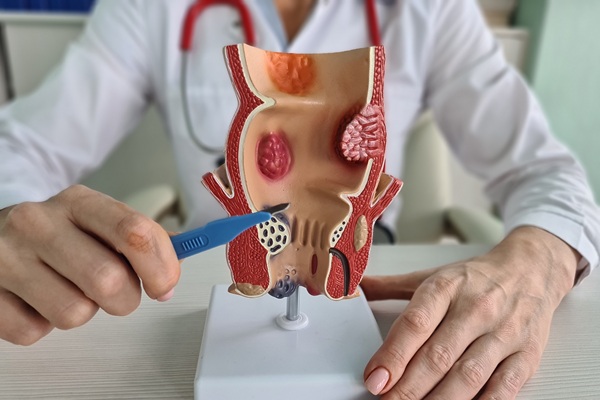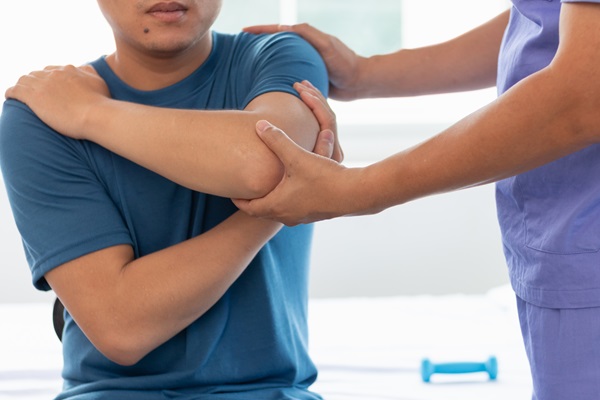Knee Arthritis TreatmentOrange, CA
Knee arthritis is a common and painful condition that refers to the joint undergoing repeated stress due to trauma, such as a fall, sports injury, or overuse. Even daily sports such as tennis or basketball can cause arthritis over time. In some cases, knee arthritis may be genetic or caused by obesity or other conditions that result in excess body weight bearing down on the knees.
Whatever its cause, our dedicated team of vascular specialists is here to provide you with knee arthritis treatment that focuses on the source of the issue and not just relieving symptoms. To learn more about arthritis treatment options or to schedule an appointment, call us today at 714-598-1194.
Understanding Arthritis in The Knee
Knee arthritis is a condition where the cartilage within the joint begins to deteriorate. As a result, bone rubs against bone, causing the patient pain and stiffness. If left untreated, it can lead to permanent disability and pain.
It is important to note that several types of arthritis exist. The most common we see are osteoarthritis and hemarthrosis arthritis. Osteoarthritis is a chronic disorder of the joints involving degeneration of cartilage and bone. It can affect any joint in the body but most commonly affects the hips, knees, lower back, and fingers. Hemarthrosis, on the other hand, refers to bleeding into a joint cavity, blood vessel, or both. It is usually a result of trauma.
Check out what others are saying about our Knee Arthritis Treatment services on Yelp: Knee Arthritis Treatment Orange
Symptoms of Knee Arthritis
The symptoms of knee arthritis mainly result from inflammation in the joint, which ultimately leads to tissue and bone damage. The most common symptom is pain at rest or with movement. Patients with mild forms of this condition usually only experience pain when walking. However, those with severe forms of arthritis may feel constant pain 24/7.
As time goes on, the pain worsens and can become severe enough to make walking difficult or impossible without using aides, such as canes or crutches. Due to the many types of arthritis, patients may not be sure about the cause of their pain or other symptoms, which is fine. During the initial appointment, we will inquire about symptoms the patient may be experiencing. In turn, this will help us determine what type of testing we need to administer.
Causes of Knee Arthritis
Various causes exist for the different forms of arthritis. Since each patient is unique, our team will assess their lifestyle and other external factors such as natural wear and tear, age, genetics, and previous injuries.
Wear and tear is the most common cause of knee arthritis that occurs when the knee cartilage gradually wears down over time from movement and repetitive stress on the joints. As patients age, the risk of arthritis increases due to a natural thinning of the tissue that cushions the bone around the joints. In addition to natural aging, some people are genetically predisposed (or more likely) to develop osteoarthritis in their knee(s). Patients with injuries or surgery in one or both knees may also increase the risk of developing arthritis.
If a patient has had a previous anterior cruciate ligament (ACL) tear or meniscus injury on one side but not both sides (unilateral), then having another ACL tear or meniscus injury on either side would increase the likelihood of developing osteoarthritis there, too–even if it is years later. In other cases, a patient with joint replacement surgery for other reasons besides osteoarthritis (such as rheumatoid arthritis) will also increase the risk of developing osteoarthritis at these sites due to increased wear and tear during regular activities after surgery.
Minimally-Invasive Treatment Options
For patients experiencing mild forms or early stages of arthritis, non-surgical remedies can help reduce inflammation in the joints. Patients may consider resting the joint, using ice, compressions, elevating the leg to promote circulation, light exercise, and dietary changes.
Cortisone Shots
A cortisone shot is an injection that uses medication to reduce pain and inflammation while not addressing the condition's underlying cause. The injection will allow the body to heal itself pain-free. Our team offers cortisone injections as a non-invasive yet effective alternative to surgery.
During the initial consultation, and it is decided the patient will be a good candidate for the injections, one of our specialists will walk them through their treatment plan. It is worth noting that cortisone injections are a short-term treatment option to help patients manage their arthritis symptoms. From start to finish, the process usually takes less than half an hour, depending on the level of pain the patient is in and the number of injections needed in one session. Multiple sessions are an option if the patient is not ready for surgery.
Geniculate Artery Embolization
Geniculate Artery Embolization (GAE) is a minimally invasive treatment option for multiple forms of arthritis, including osteoarthritis, rheumatoid arthritis, and hemarthrosis. During the procedure, a catheter is inserted into an artery in the leg and guided into the geniculate artery by the patient's neck. The doctor will then place particles called emboli into the same artery that will block blood flow to the knee joint. This procedure blocks the blood supply to the inflamed synovial lining around the knee joint. This will reduce inflammation, pain, and swelling.
This procedure can help those with severe knee pain or who have not responded to other treatment options such as physical therapy, medication, or cortisone shots.
In-Between Visits
Taking care of the site a patient is experiencing arthritis is an important part of their treatment plan. Depending on their treatment option and the severity of their condition, our doctor will advise the patient on proper home care. Common tips our doctors may recommend are dietary changes, compression stockings, exercise, or physical therapy.
Frequently Asked Questions
What should I do after taking a cortisone shot?
Upon returning home, allow the body time to rest by elevating your leg(s) above heart level as swelling may occur at the injection site. Do not engage in any strenuous exercise or activity until our specialist approves you to do so.
Are there any side effects to taking a cortisone shot?
Yes. Like with any medication, there are potential side effects such as soreness, swelling, and bruising at the injection site. These symptoms typically go away within 72 hours. Additional side effects include headaches, nausea, dizziness, drowsiness, high blood pressure, raised blood sugar levels, triglycerides, heart attack, stroke, and kidney problems caused by too much cortisone.
How do I know if I qualify for cortisone shots or GAE?
You will schedule an appointment with one of our specialists, where there will be an in-depth evaluation of your medical history, arthritis type, and a physical exam. Our vascular specialist will educate the patient on the benefits and risks (if any) of both options. Patients will be advised on an effective treatment plan by the end of their appointment.
How many shots am I able to get?
You will be advised by one of our specialists. Remember, cortisone injections are a short-term solution and should be treated as such. They will give the body time to heal if your arthritis is caused due to weight gain, for example.
How do I know my specific type of arthritis?
With several types of arthritis, it can be difficult for patients to determine theirs by themselves. Therefore, our team provides an in-depth physical examination and reviews the important medical histories of all our patients before crafting a custom treatment plan. After we run our tests and examinations, our doctor will determine a diagnosis. Additionally, if arthritis is not evident, we will work with you to determine what is going on with your body.
Call Us Today
With the right treatment, arthritis can be managed. The key is determining the type of arthritis the patient may have and then implementing an effective treatment plan. If you are struggling with knee pain and believe arthritis is the culprit, contact our office at 714-598-1194 to schedule an appointment or receive additional information about our services.
Vascular & Interventional Specialists of Orange County is located at 1010 W La Veta Ave Suite 320 Orange, CA 92868.





